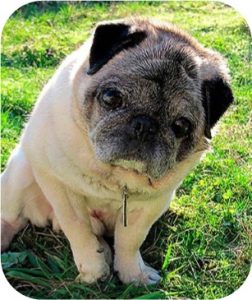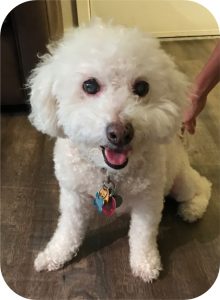Please Don’t Feel Sorry for Me
Those of us who live with senior dogs that have what most people would perceive as limitations, disabilities, age-related illnesses and disease often have a difficult time deciding whether to sing the “Poor Baby” song or act as cheerleaders encouraging the dog to be the best version of himself that he can be right now at this time in his life.
If you’ve adopted a rescue senior dog or are fostering a Final Refuge dog for Old Dog Haven it’s hard not to fall into the “poor baby” trap because you know your dog has either experienced grief, abandonment, neglect, abuse, or all of the above and has ended up as a throw-away shelter dog that hasn’t been cared for physically, mentally or emotionally. Or, you may have a dog that came from a family who loved him but he’s been suddenly become homeless because of circumstances beyond his control.
Here’s what’s important to remember: Dogs live in the moment and you need to be in the moment with your dog too. We have no control over what went on in the dog’s past, so treating him like an invalid or a wounded warrior serves no useful purpose. Feeling sorry for the dog doesn’t allow the dog the freedom to be happy about today. Your pity contaminates what’s possible. Celebrate your dog’s spirit and help him live his life happily and productively. Once a dog feels safe and loved his ability to cope with his limitations is impressive—especially if he has someone he trusts acting as cheerleader.
As I’m writing this I’m thinking about dogs I have known that have been and are wonderful examples of dogs that learned how to be the best versions of themselves because they had cheerleaders not people who felt sorry for them:
I’m thinking about Ernesto, a dog I wrote about in the book Old Dog Haven: Every Old Dog Has a Story to tell. Ernesto was blind, deaf, crippled in his front leg and shoulder and exhibited the residual effects of vestibular syndrome. Ernesto’s foster mom Tricia described him as “not disabled, just differently abled.” Tricia said, “If Ernesto can adapt then I can adapt too.” Clearly Tricia was a cheerleader and learned valuable lessons from a little dog that approached life with a positive attitude with her help.
I’m also thinking about KayCee, another dog featured in the Old Dog Haven book. KayCee ended up at a shelter when she was 12. Her eyes were so painful and badly damaged they had to be removed and when she was about to be spayed the vet discovered she was pregnant. Ten days later she delivered two healthy puppies. That’s all in the past, and now, at age 19, KayCee is still going strong and is Old Dog Haven’s longest resident dog. Her foster mom Monica says, “She knows exactly where she is when we go to any Old Dog Haven function … she has a lot of energy for this type of thing. She knows she’s among friends. She has a very soft, beautiful personality and instantly mesmerizes everyone she meets. It’s pretty amazing to watch.”
And then there’s Marvelous Marvin. Dawn, Marvin’s Final Refuge mom, never ceases to be amazed by her blind dog. “Marvin is ah-mazing. He is so patient; if I get frustrated for him with certain challenges, he just shrugs it off and tries again.” Dawn once told some children who felt sorry for Marvin to “feel proud of Marvin! Marvin doesn’t feel sorry for himself. Marvin is proud of all he can do without being able to see!” Once again, a cheerleader helps a dog live life to the fullest.
I’m also thinking about my friend Reggie, sleeping next to me as I write this. Reggie is an old guy and he’s also blind and deaf. Every morning we walk on the beach and when he first came to us I kept him on leash when we were on the beach, but as time passed I saw that he was comfortable and safe in his surroundings so I let him explore on his own. I don’t let him stray too far away from me so he’s able to use his radar to sense where I am and he has a great time. His tail doesn’t stop wagging when we’re on the beach. When we’re ready to go back to the parking lot we need to get over a large log, so at first I lifted Reggie over the log but one day I could almost hear him say, “I can do this.” So, now I let him get close enough to the log to put his front paws on the log and he just hops over … very proud of himself.
If your dog’s issue is mobility rather than visibility or hearing you may have a stroller you use when you go for walks. That’s great, but you might want to let the dog walk a bit too so his sense of independence isn’t compromised by always being in the stroller. Or, if your dog is too big for a stroller, try very short walks or water therapy just to help him feel that he’s moving forward with his life (metaphorically and physically).
Food is another area where you may tend to fall into the “poor baby” trap. Over feeding your dog because you feel sorry for him isn’t a good idea. I know this is hard because we relate food to comfort and if you have a dog that was very thin when he came to you, it’s easy to just keep feeding large or many portions even when the dog has returned to normal weight. Carrying extra weight is hard on the heart and back. Try more hugs instead of treats.
Or perhaps your dog has cancer or some other life-threatening disease. My friend Corrie, also sound asleep nearby as I write, has metastases cancer, but she doesn’t allow the disease to define who she is. She doesn’t want or need pity; she just wants to be loved and to run on the beach.
I could give you dozens of other examples of dogs that are thriving because their people don’t feel sorry for them and are interested in helping the dog use whatever abilities he has to function and be happy but I’m sure you get my point. Please understand too that I’m not suggesting that sympathy and compassion aren’t appropriate emotions to express to your dog because it’s also important that he understands you know what he’s experienced in his past, but there’s a big difference between positive compassion and pity.
Dogs want to be valued as they are and with a little encouragement they’ll rise to the occasion and do just fine, regardless of their apparent limitations, IF you eliminate the “Poor Baby” song from your repertoire and sing “I Can Do That” as a duet with your dog. Then, as an encore you could both channel your inner Louis Armstrong and sing “What a Wonderful World.”







